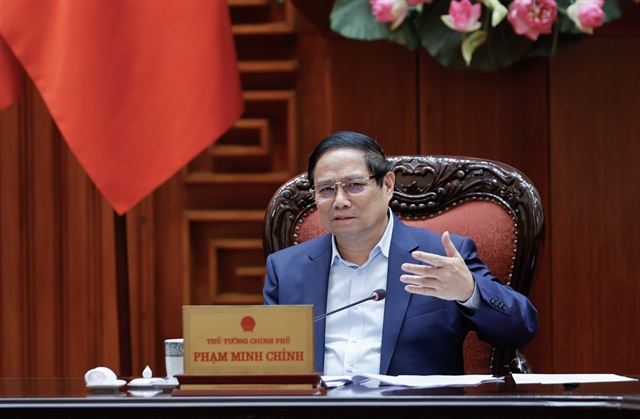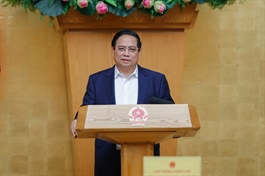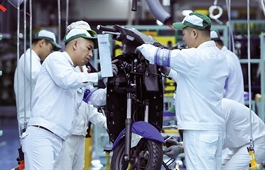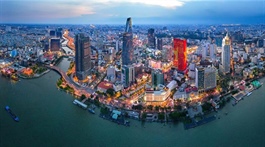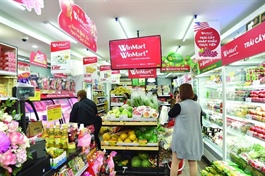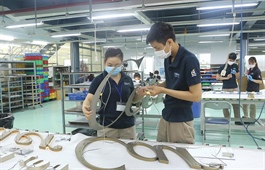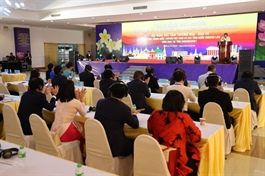Vietnam explores solutions in face of US tariffs
Vietnam explores solutions in face of US tariffs
Vietnamese Prime Minister Pham Minh Chinh on Saturday presided over the second meeting of the government to discuss measures in response to the United States’ imposition of retaliatory tariffs on Vietnamese goods.
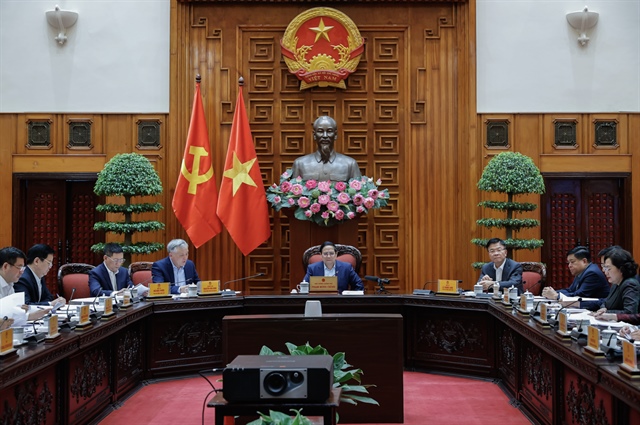
Prime Minister Pham Minh Chinh chairs a meeting on April 5, 2025 to seek solutions to deal with U.S. tariffs. Photo: Vietnam Government Portal |
The government leader emphasized the importance of a proactive, flexible, timely, and effective response to external developments.
He stressed that in difficult times, it was crucial to maintain calm, resilience, determination, confidence, and the ability to turn challenges into opportunities.
Vietnam and the U.S. are in comprehensive strategic partnership, with their economic and trade relations growing based on complementary economies rather than competition.
Vietnam ranks among the largest trade partners of the U.S. and is the biggest trade partner in Southeast Asia. While Vietnam enjoys a trade surplus with the U.S., this benefits both nations.
Therefore, the 46-percent reciprocal tariff rate announced by the U.S. on Thursday could negatively impact Vietnam’s exports, affect the indirect markets, and ultimately harm American consumers.
A comprehensive and long-term approach is needed, involving a synchronized use of political, diplomatic, economic, investment, and trade measures, according to the prime minister.
Vietnam must also leverage both domestic and foreign businesses, including American enterprises in the nation, to find suitable negotiation solutions.
He instructed the Ministry of Finance to continue reviewing existing tariffs and expanding policies under Decree 73 lowering import tariffs on various U.S. goods in line with the high-level agreement reached between Party General Secretary To Lam and U.S. President Donald Trump during their phone talks on Friday.
The Ministry of Industry and Trade was tasked with boosting imports from the U.S. and advancing negotiations on upgrading the Vietnam-U.S. bilateral trade agreement.
The Ministry of Foreign Affairs was asked to arrange meetings for Vietnam’s negotiation delegation with key agencies in the U.S..
The ministry was urged to work with the Ministry of Industry and Trade to propose the U.S. delay the implementation of the reciprocal tariff on Vietnamese exports while negotiations are ongoing.
The prime minister also highlighted that during these negotiations, it is important to ensure that Vietnam's relations with other trade partners will not be negatively impacted.
|
|
| Prime Minister Pham Minh Chinh. Photo: Vietnam Government Portal |
Strengthening economic restructuring
Vietnam will continue offering incentives on taxes, fees, and charges to support businesses and encourage domestic production and consumption.
The prime minister reaffirmed that the government will always stand by the people, companies, and investors.
Also, he emphasized the importance of controlling the origin of goods, as well as brands, copyright, and intellectual property.
The government leader called for accelerating the restructuring of the economy toward sustainable, green, digital, and creative development, while diversifying markets, products, and supply chains to reduce dependence on any single market.
Potential new markets in the Middle East and Central Asia should be explored.
He reiterated that while these pressures may be challenging, they present an opportunity for Vietnam to innovate, break through limitations, and emerge stronger.
The most critical task, however, is to provide solutions that support residents and businesses during these tough times.
PM Chinh instructed the Ministry of Finance to prepare contingency plans to support businesses that face difficulties.
Vietnam is among the countries facing steep retaliatory tariffs from the U.S., with a 46-percent rate, among the highest announced by President Donald Trump during a White House Rose Garden ceremony.
U.S. customs agents began collecting President Donald Trump's unilateral 10-percent tariff on all imports from many countries on Saturday, with higher levies on goods from 57 larger trading partners due to start next week, Reuters reported.
- 10:40 06/04/2025


